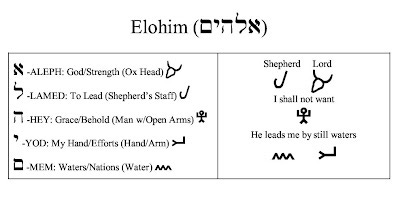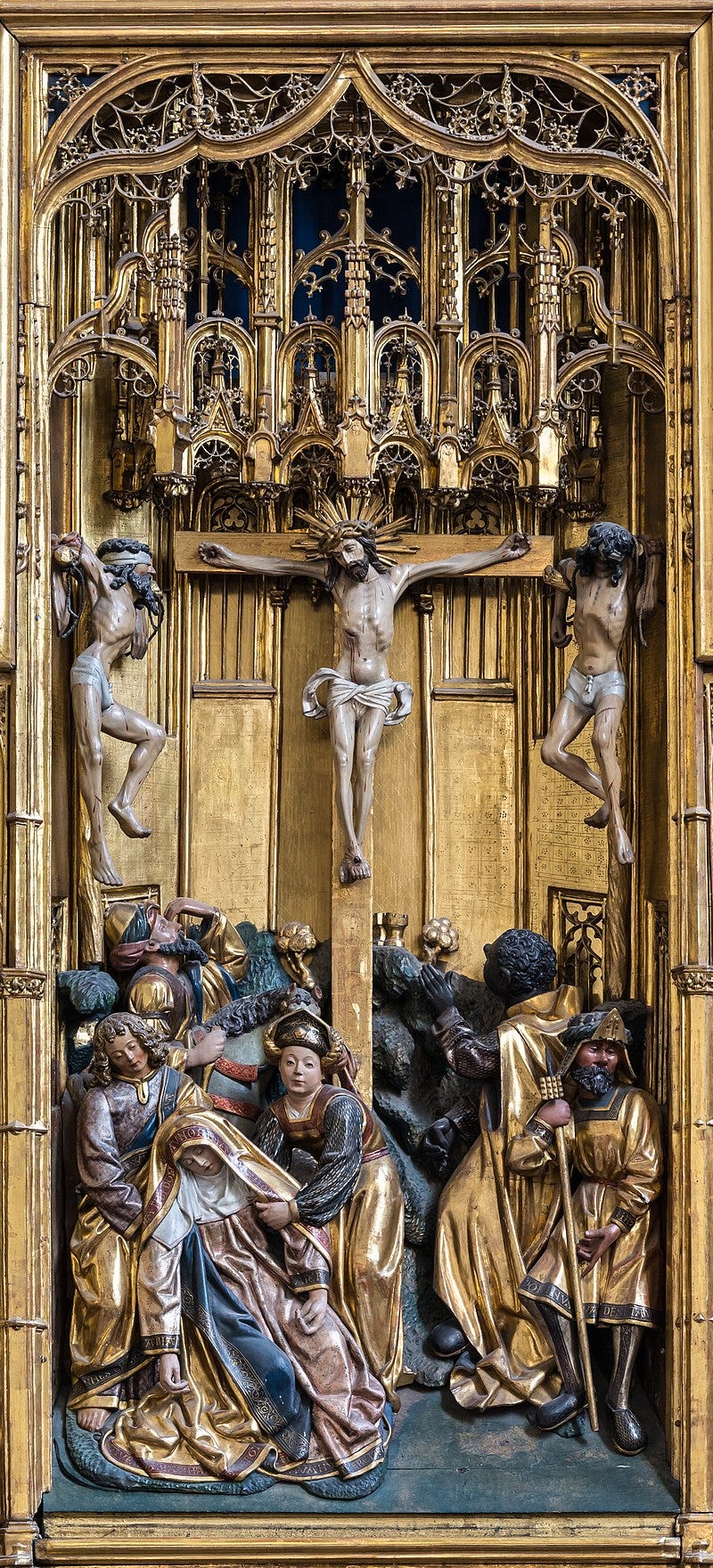Not So Idolatrous
Insight Behind the Golden Calf of the Bible
Welcome to Polymathic Being, a place to explore counterintuitive insights across multiple domains. These essays take common topics and investigate them from different perspectives and disciplines to come up with unique insights and solutions.
Today's topic investigates a story that many of us are familiar with from Sunday School or at least within the larger fabric of Western Culture; the Golden Calf from the time of Moses. While it looks like an egregious violation of paganism, when we dive in a little, we find it’s not quite so simple, nor as disobedient as it appears.
Introduction:
As background for this quick analysis, we should think back to the essay on Exegisis and how reading from the text and understanding the culture, language, and people of the time is crucial for the analysis of older texts within contemporary reading.
With this analytical model in mind, let’s look at the text from Exodus 32
32 Now when the people saw that Moses delayed to come down from the mountain, the people assembled around Aaron and said to him, “Come, make us a god who will go before us; for this Moses, the man who brought us up from the land of Egypt—we do not know what happened to him.”
2 Aaron said to them, “Tear off the gold rings which are in the ears of your wives, your sons, and your daughters, and bring them to me.”
3 So all the people tore off the gold rings which were in their ears and brought them to Aaron.
4 Then he took the gold from their hands, and fashioned it with an engraving tool and made it into a cast metal calf; and they said, “This is your god, Israel, who brought you up from the land of Egypt.”
5 Now when Aaron saw this, he built an altar in front of it; and Aaron made a proclamation and said, “Tomorrow shall be a feast to the Lord.”
In this text “god” in verse 4 is Elohim. This is contrasted with “Lord” in verse 5 which is YDVH or Yahweh. Why two different words for God? This opens the first can of worms of how the Bible was compiled.
Documentary Hypothesis
Who wrote the Bible? Simply put, many people wrote it as is discovered when looking at the Documentary Hypothesis. This theory is based on linguistic analysis of the Bible texts and the understanding that what we call the Old Testament was compiled during the Babylonian Captivity between 597 BCE and 538 BCE and called the Masoretic Text. Bottom line, they estimate five key constituent writings that were merged into the text as we know it.
The Yahwist: Where we get the name of God as YDVH or Yahweh
The Elohist: The second prime contributor to the stories
Deuteronomist: Largly making up Deuteronomy and the laws
Priestly: Making up the rest of the laws and other discussions
X - Kind of the filler text that we don’t have a solid understanding of
Of note, there are also other sources that are referenced in the Old Testament that are no longer available to us known as the lost books of the Bible. They include the Book of the Wars of the Lord mentioned in Numbers 21:14 and The Chronicles of the Kings of Israel and The Chronicles of the Kings of Judah which are mentioned in 1 Kings 14:19,29.
With this context, we can dive back into the nuance behind Elohim.
Which God?
Whether we use the term Elohim or YDVH is largely determined by the source that fed which part of the story. Even more interesting is that the Hebrew alphabet was borrowed almost extant from the Phonenician pictographs and only formed into the block letters thousands of years later.
Before we get into Elohim, YHVH is another name for god often pronounced Yahweh. Yet the Hebrew alphabet doesn’t have vowels and so we only know for certain the consonants and guess at what the vowels might have been. (YHVH to many is pronounced “Yod Hey Vah Hey”, literally pronouncing the consonants) For this study, we’ll pause on this name since it appears to be a later addition to the story.
Returning to the Elohist source and looking at those early Phonecian pictographs we find that the root of Elohim, El is a picture of an Ox (aleph) plus the picture of a Yoke (lamed). The idea being communicated with El is that you are yoking yourself to a greater strength or power.
The rest of Elohim consists of pictographs representing Grace, Effort, and Chaos making the entire word for God read roughly as “the strength I’m connected to that stills the chaos.” Many other interpretations attempt to tie it to other biblical verses and concepts but loosely we start to see the larger concept of yoking (submitting) ourselves to a greater power.
So Why a Calf?
Why on earth did the Israelites think, mere weeks out of slavery in Egypt, that making a golden idol in the form of a calf was kosher? (pun intended) Given that their God had just handed down the covenant terms, what we call the Ten Commandments, of which the first two are to have no other gods and to make no idols, this seems especially egregious.
Well, the calf is a diminutive form of the ox. It’s logical to interpolate that to represent the God who brought them from Egypt, they’d create a representative model of how they describe their God. The strength of an ox cast in the form of an intermediary calf.
Far from being a shockingly pagan idol with zero connection to the God they claim to follow it suddenly becomes illuminated in the same context that the modern church displays a cross as a symbol for God.
I wouldn’t go so far as to suggest this absolves them of wrongdoing according to a critical reading of the Bible but it does highlight that it wasn’t as completely illogical as it appears at first blush. As Rabbi Eli L. Garfinkel, who writes Gimme Some Torah, commented in feedback to this essay:
Technically speaking, it’s heresy, but it’s interesting heresy! :)
He went on to clarify that while this nuance is interesting we shouldn’t miss the main point of the story which is how Aaron tried to stand up to an agitated mob and did what he thought he had to do to keep things together. Rabbi Garfinkel shares:
My favorite verse in the story is Ex. 32:24 - "So I said to them, ‘Whoever has gold, take it off!’ They gave it to me and I hurled it into the fire and out came this calf!” That verse always gives me a chuckles because it shows Aaron in a desperate struggle to explain what he’s done. “Oh gee, look what happened, a golden calf walked out of the fire!”
So there are two stories here. The first is that there’s almost always a nugget of golden truth that we can use to justify an action. The second is that we often buckle to the pressure of popular opinion and use that nugget of gold to justify our actions.
I think uncovering the link between the Ox and the calf makes this story hit closer to home because we can look at it and go, “Ooohhhh… that isn’t as blatantly wrong as I thought…” In fact, it certainly causes me to pause and look for when I’ve stretched to justify my own Golden Calf moments at work, in life, and in faith.
Summary
I find it fascinating that when we sit back and understand the additional layers of context that surround even ancient stories, we find that there’s much more than meets the eye. It highlights the power of Systems Thinking where we approach things with insatiable curiosity, the humility to learn more, and intentional reframing to understand the topic from another perspective.
This is a fun example that many of us grew up with in the Western Tradition yet I’m sure there are a ton of other examples we can also learn from. Please share your insights on when you’ve encountered a similar story!
Enjoyed this post? Hit the ❤️ button above or below because it helps more people discover Substacks like this one and that’s a great thing. Also please share here or in your network to help us grow.
Polymathic Being is a reader-supported publication. To receive new posts and support my work, consider becoming a free or paid subscriber.
Further Reading from Authors I really appreciate
I highly recommend the following Substacks for their great content and complementary explorations of topics that Polymathic Being shares.
Goatfury Writes All-around great daily essays
Never Stop Learning Insightful Life Tips and Tricks
Cyborgs Writing Highly useful insights into using AI for writing
One Useful Thing Practical AI
Great all-around tech topics









It was not a easy job leading slaves out of Egypt. Especially the ones that are used to commodification of life, the gold being it's symbolic manifestation. Of course, the gold is of no use if it doesn't have the exchange value for a cattle or Khorasan wheat (Kamut), einkorn, and emmer, but it takes a vampire-like all-persuasive form of exchange value. Buddha forbade such aggrandisement of wealth, but to no avail. So did Moses, "he freed the slaves from Egypt", like how Jesus tried and Mohammed did many centuries later, only for them to become rulers of India, a backward caste society, easy to be ruled over, who had their own Jesus, Mahatma Gandhi, to lead them out of colonisation. Not easy this business of leading people, quite risky. Like Jesus and Mahatma found, love and peace are risky business, but what other choice we have?
"Whether we use the term Elohim or YDVH is largely determined by the source that fed which part of the story. "
I think you're missing another piece of the puzzle here. To my understanding "elohim" is NOT another name for the God of Israel. Yahweh is a proper name for Israel's God.
"Elohim" is more akin to a type of being rather than a proper name. It's like saying "Spiritual being". See: Samuel 28:13 (ESV): The king said to her, “Do not be afraid. What do you see?” And the woman said to Saul, “I see a god (elohim) coming up out of the earth.” Sometimes translated as "ghostly figure" here, but it's still the word elohim.
That is, there are many "elohim" in the bible. Angels are considered elohim. Yahweh is an elohim. But he's THE Elohim. That's why there are phrases like Deuteronomy 10:17 that says "The LORD (Yahweh) your God (Elohim) is God (Elohim) of gods (elohim) and Lord of lords, the great God, mighty and awesome. And why the 1st commandment is "You shall have no other gods (elohim) before Me.”